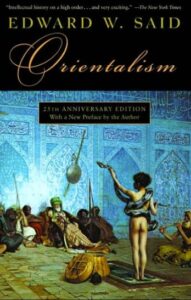Press Releases: Historiography Edition
Hadzima- Said, Orientalism
Historiography Connections
Cultural History, Post-colonial History, and Middle Eastern History
Geographical Connections
Covers Europe and the Middle East
Book Citation
Said, Edward W. 1978. Orientalism. New York: Vintage Books
Press Release
The late Edward Said was a Palestinian-American philosopher, political activist, and a professor of literature at Columbia University. He has written many books with his most notable work being his 1978 release of Orientalism. (1) Said’s work coined and redefined Orientalism by referencing the cultural impacts and western views of the post-colonial Middle East. This redefinition was one that sparked debates among the fields of politics and the social sciences. Orientalism has a large impact on cultural history for its presentation of a Eurocentric outlook on a false contrived view of the east.
Content
Said’s work in Orientalism has a lot of density and complexity. He distinguished Orientalism into three meanings that are all interconnected to one another. The three meanings being the academic studies in or pertaining to the East, the worldview characteristics of the Orient, and a loose interpretation of world order. (2) According to Said, the key idea is that Orientalism does not display the objective truth. Instead, it is an invention of the Western thoughts and outlook of the orient. The central premise of Orientalism is that the Orient is fundamentally different, exotic, threatening, and underdeveloped. This paves a pathway for the west to dehumanize and view the Orient as “the other”. (Said 4) This concept of a foreign and strange East form a set of cultural, political, religious, and linguistic contrasts that enables the West to think of itself as a distinct and superior entity. Said also goes on to identify the West’s false interpretations of the Orient. The West portrays that the Orient is irrational, anti-Western, barbaric and insidious. Due to this depiction, the West constructed the Orient in a way that serves as a justification for their colonial rule.
Methods
Saids re-definitive approach Orientalism is a way of defining and identifying Europe’s view of the other. (2) Its aim is not to investigate the varied disciplines nor the historical or cultural provenance of Orientalism. He aimed to reverse the gaze of the discourse in order to analyze it from the point of view of the Orient. (Said 25) Said also gets personable as he was a Palestinian- American who had a first-hand experience of being the other. His experience of living in the United States, where the East signified danger and threat, is the source of the worldliness of Orientalism. The provenance of the book demonstrates the stereotypes of Orientalist discourse. It emerges directly from the ‘disheartening life’ of an Arab Palestinian in the West. (4)
Critique
The publication of Orientalism in 1978 was a site for controversy and criticism for decades to come. One critique in particular comes from Ibn Warraq, who Critiques Said in his scholarly work of Defending the West: A Critique of Edward. He believes that “Orientalism smears all Orientalists with the same black paint. Its ideological framework includes and gives equal weight to the writings of ignorant Travellers, amateur journalists and learned scholars. It advances the view that Western attitudes towards the Orient form a unified discourse with immutable values and assumptions.” (3) Warraq frames his claims to argue that Said does the same thing to Europe in his depictions of the Western, Eurocentric outlook that he argues Europeans did to the Orient.
Impact on Historiography
Said views these assumptions as a gateway to alter one’s global perspective. The false depictions became treated as the truth. Therefore, it had a great impact on not only relations and ideologies, but also the overall global perspective of the East. Said called for a new treatment and outlook of the Orient. One that will allow for self-representation of the people belonging to the Orient rather than depending on secondhand representation. Said also indicates the significance of post-colonial studies and how it impacted the cultural history of the East. With the constant references to the post-colonial East, this approach deemphasizes both the earlier pre-colonial history of the Orient and the differences in the imperial impact on different cultures. Post-colonialism emphasizes relations between the colony and the metropole, making imperialism one of the most important factors in the history of the Orient. At the same time, they have shifted the increasing interpenetration of the third and first world societies associated with globalization.
(1.) Some examples of his other books include Said, Edward W. Culture and Imperialism. (London: Vintage 1994), Covering Islam How the Media and the Experts Determine How We See the Rest of the World (London Vintage Books 1981), and his memoir Out of Place (Granta Books 2000).
(2.) Said, E.W. Orientalism. (London: Vintage Books 1978)
(3.)Warraq, I. (2007) Defending the west: A Critique of Edward Said’s orientalism – dissent, Dissent Magazine. Available at: https://www.dissentmagazine.org/wp-content/files_mf/1389822043d12Zarnett.pdf (Accessed: November 1, 2022).
(4.) Said, E.W. Out of Place (Granta Books 2000).


